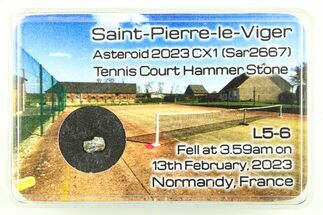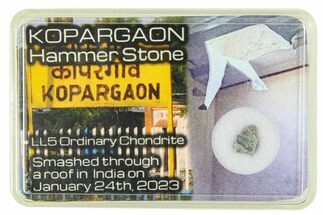This Specimen has been sold.
.74" L5 Chondrite Meteorite (1.21 g) Slice - El Menia
This is a .74" wide (1.21 gram) slice of the L5 chondrite known as El Menia, which fell in Algeria on March 11, 2023. One side has been lightly polished, revealing its variety of interior chondrules and metal grains. Its outer edges display a nice dark fusion crust.
This specimen comes in its own labeled display case.
This specimen comes in its own labeled display case.
The El Menia Meteorite
El Menia is the name given to a witnessed fall over Algeria in 2023. This massive L5 chondrite lit up the skies around 10:30 AM local time on March 11th, 2023, in the regions around central Algeria. The fireball exploded over the city of El Menia, showering the city and surrounding farmland with bluish, fusion-crusted stones: some were even reported to "skip" over desert sand! To date, about 75 kilograms' worth of stones have been recovered from the areas around El Menia.
The chondrite itself displays varied chondrule sizes amassed in a light gray matrix.
Meteoritical Bulletin: Entry for El Menia
El Menia is the name given to a witnessed fall over Algeria in 2023. This massive L5 chondrite lit up the skies around 10:30 AM local time on March 11th, 2023, in the regions around central Algeria. The fireball exploded over the city of El Menia, showering the city and surrounding farmland with bluish, fusion-crusted stones: some were even reported to "skip" over desert sand! To date, about 75 kilograms' worth of stones have been recovered from the areas around El Menia.
The chondrite itself displays varied chondrule sizes amassed in a light gray matrix.
Meteoritical Bulletin: Entry for El Menia
What Is An L5 Chondrite?
An L5 chondrite is a type of stony meteorite that falls under the "L" (low iron) chondrite group. L chondrites have lower iron content (around 7-11% iron, mostly in the form of iron sulfide or silicates) and typically show less metal than H chondrites (high iron chondrites). They primarily consist of silicate minerals like olivine and pyroxene.
The "5" rating indicates a high degree of thermal metamorphism. This means that the L5 chondrite experienced substantial heating, likely on its parent asteroid, which caused partial recrystallization of minerals. As a result, the original chondrules (small, rounded particles) are less distinct and partially altered, though still visible. L5 chondrites usually have a light to medium gray matrix, and the chondrules tend to be less clearly defined due to metamorphic alteration. You may still see rounded chondrule outlines, but they appear partially integrated with the surrounding matrix.
The L chondrite group is believed to come from a specific parent body in the asteroid belt, which likely experienced a major collisional event. This event may have sent large quantities of L chondritic material into space, resulting in the abundance of L chondrites found on Earth.
An L5 chondrite is a type of stony meteorite that falls under the "L" (low iron) chondrite group. L chondrites have lower iron content (around 7-11% iron, mostly in the form of iron sulfide or silicates) and typically show less metal than H chondrites (high iron chondrites). They primarily consist of silicate minerals like olivine and pyroxene.
The "5" rating indicates a high degree of thermal metamorphism. This means that the L5 chondrite experienced substantial heating, likely on its parent asteroid, which caused partial recrystallization of minerals. As a result, the original chondrules (small, rounded particles) are less distinct and partially altered, though still visible. L5 chondrites usually have a light to medium gray matrix, and the chondrules tend to be less clearly defined due to metamorphic alteration. You may still see rounded chondrule outlines, but they appear partially integrated with the surrounding matrix.
The L chondrite group is believed to come from a specific parent body in the asteroid belt, which likely experienced a major collisional event. This event may have sent large quantities of L chondritic material into space, resulting in the abundance of L chondrites found on Earth.
TYPE
L5 Chondrite
LOCATION
El Menia, Ghardaïa Province, Algeria
SIZE
.74" wide, 1.21 grams
CATEGORY
SUB CATEGORY
ITEM
#285483
 Reviews
Reviews












